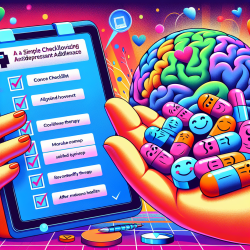Introduction
In the realm of mental health, Major Depressive Disorder (MDD) presents a significant challenge, with poor adherence to antidepressant treatments being a prevalent issue. Recent research has highlighted a psychoeducational consensus checklist that can dramatically improve adherence rates. As practitioners, understanding and implementing these findings can lead to better outcomes for patients, particularly children who are indirectly affected by adult mental health issues.
The Importance of Adherence
Adherence to antidepressant medication is crucial for effective treatment of MDD. Nonadherence can lead to negative outcomes such as relapse, increased morbidity, and mortality. The research underscores the need for a strategic approach to improve adherence, focusing on both patient-related and clinician-related factors.
Key Findings from the Research
The research identifies several critical factors that influence adherence:
- Patient Education: Providing clear information about the diagnosis and the biological basis of MDD can help patients understand the importance of medication.
- Shared Decision-Making: Engaging patients in the treatment process and discussing their expectations can improve adherence.
- Follow-Up Care: Regular follow-ups to monitor progress and address any concerns can prevent premature discontinuation of treatment.
Implementing the Checklist
The checklist developed from the research provides a structured approach for clinicians to discuss treatment with patients. Key components include:
- Explaining the diagnosis and treatment rationale.
- Discussing the necessity and benefits of medication.
- Providing a detailed plan for short-term and long-term treatment.
- Addressing potential side effects and how to manage them.
- Involving family members or caregivers in the treatment plan.
Encouraging Further Research
While the checklist offers a promising tool, continuous research is essential to refine these strategies and adapt them to diverse patient populations. Practitioners are encouraged to engage with ongoing studies and contribute to the evolving understanding of treatment adherence.
Conclusion
Improving adherence to antidepressant treatments is a multifaceted challenge that requires a comprehensive approach. By implementing the checklist and engaging in further research, practitioners can enhance treatment outcomes and improve the quality of life for patients with MDD. For those interested in delving deeper into the research, the original paper offers a wealth of insights and can be accessed here.










